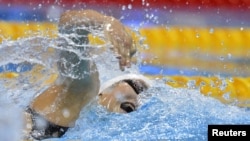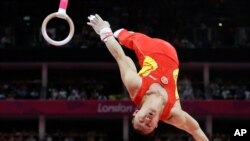Chinese swimmer Ye Shiwen set an Olympic record Tuesday by winning her second gold medal at the London Games, adding the 200-meter individual medley title to a world-record performance in the 400 individual medley that sparked suspicions of doping.
The International Olympic Committee and her fellow swimmers came to her defense after U.S. coach John Leonard suggested the 16-year-old's first victory was too "unbelievable and "disturbing."
"History in our sport will tell you that every time we see something, and I will put quotation marks around this, "unbelievable," history shows us that it turns out later on there was doping involved," Leonard told The Guardian on Monday.
China blasted what it called "biased" doping allegations against one of its young swimming stars.
"I think it is not proper to single Chinese swimmers out once they produce good results," said Jiang Zhixue, who heads the anti-doping agency of China's General Administration of Sport. "Some people are just biased." Jiang said Chinese athletes, including the swimmers, have taken nearly 100 drug tests since they arrived in London.
The 16-year-old Chinese swimming sensation set aside her feelings to score another win Tuesday.
Ye won gold in the women's 400-meter individual medley Saturday with an unprecedented performance, shattering the previous world record by more than a second. She swam the final 50-meter lap faster than American Ryan Lochte did in the men's race.
Leonard compared Ye's performance to that of Irish swimmer Michelle Smith, who tested positive for performance enhancing drugs following her victory in the same race during the 1996 Atlanta Olympics.
Jiang said her success was the result of an "advanced training method and hard work," adding that China never questioned American swimmer Michael Phelps when he won eight gold medals during the 2008 Beijing Olympics.
In the past, Chinese swimmers have been tainted by high-profile doping scandals, most notably in the 1994 and 1998 world championships.
The International Olympic Committee's medical commission chief, Arne Ljungqvist, has said Ye should not be thought of as guilty unless it has been determined that she has tested positive for a banned substance.
But Ross Tucker, a South Africa-based sports medicine researcher, says there is good reason to be skeptical about Ye's performance, which was seven seconds faster than her time in last year's world championship final.
"History has told us that we need to regard these kinds of amazing performances with some suspicion," Tucker told VOA, saying that those who follow the sport closely are well aware of the history of Chinese doping scandals.
"Since 1990, 40 Chinese swimmers have tested positive for banned substances," he said. "That's three times higher than the second worst offender."
Photo Gallery: Olympics Day 3






